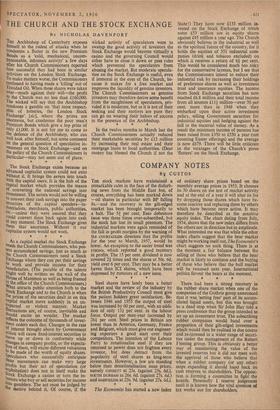THE CHURCH AND THE STOCK EXCHANGE
BY NICHOLAS, DAVENPORT himself Archbishop of Canterbury exposes rumself to the rudest of attacks when he condemns a flutter in the new Premium Bonds as a 'cold, mechanical, uncom- Panionable, inhuman activity' a few days after his Church Commissioners reported how successful they had been in similar activities on the London Stock Exchange. To make matters worse, the Commissioners confessed to having made a 'killing' out of Trinidad Oil. When these shares were taken over—much against their will—the profit to the Church was no less than £160,000. The wicked will say that the Archbishop condones a gamble on 'that most respect- able of lotteries, the London Stock Exchange' [sic], where the prizes are enormous, but condemns the poor man's Premium Bonds which give a top prize of only £1,000. It is not for me to come to the defence of the Archbishop, who can well look after himself, but some comment on the general question of speculative in- vestment on the Stock Exchange—and on the policy of the Church Commissioners in Particular—may not seem out of place.
The Stock Exchange exists because an advanced capitalist system could not exist Without it. It brings the savers into touch With the capital users. It is the hub of the capital market which provides the means of converting the national savings into Investment. The savers would not be willing to convert their cash savings into the paper securities of the capital spenders—in- dustrialists, merchants, public authorities, etc.—unless they were assured that they could convert them back again into cash at any moment. The Stock Exchange gives them that assurance. Without it our capitalist system would not work.
* *
As a capital market the Stock Exchange needs the Church Commissioners, who pos- sess accumulated savings, just as much as the Church Commissioners need a Stock Exchange where they can put their savings tto work and provide income for their beneficiaries. (The parable of the talents _Might well be written on the wall of the House of Mammon as well as being framed in the office of the Church Commissioners.) :that attracts public attention both to the Mock Exchange and to the Church is when the prices of the securities dealt in on this capital market move suddenly in an un- expected or violent manner. Market fluctuations are, of course, inevitable and should excite no wonder. The market reflects the outcome of thousands of invest- ment orders each day. Changes in the rate of interest brought about by Government action will cause fixed-interest securities to move up or down in conformity while changes in company profits, or the expecta- tion of them, will excite different valuations to be made of the worth of equity shares. 'peculators who successfully anticipate these movements can make very large Profits but their act of speculation (or exploitation) does not in itself make the Stock Exchange a casino or turn the in- .1/Mors who buy or sell securities for income Into gamblers. The act must be judged by we motive behind it. Of course, if the wicked activity of speculators were to swamp the good activity of investors the Stock Exchange would become virtually a casino and the governing Council would either have to close it down or pass rules which prevented the speculators from abusing the market. But moderate specula- tion on the Stock Exchange is useful, even if immoral in the eyes of the Church, be- cause it makes for a free market and improves the liquidity of genuine investors. The Church Commissioners as genuine investors may therefore derive some benefit from the • naughtiness of speculators, pro- vided it is moderate, but as it is not of their seeking and their motives are pure they can go on wearing their haloes of success in the presence of the Archbishop.
In the twelve months to March last the Church Commissioners actually reduced their marketable securities by £12 million by increasing their real estate and their mortgage loans to local authorities. (Dear money has blessed the Church if not the State!) They have now £133 million in- vested on the Stock Exchange of which some £53 million are in equity shares against £45 million a year ago. The Church obviously believes in the industrial as well as the spiritual future of the country, for it holds the equities of 351 industrial com- panies (drink and tobacco excluded) on which it receives a return of 64 per cent. This would be considered much too risky for the conservative layman, but I see that the Commissioners intend to reduce their industrial risk by increasing their holdings of preference shares as well as investment trust and insurance equities. The income from Stock Exchange securities has now reached £6.8 million and their total income from all sources £111 million—over 50 per cent. more than in 1948 when they embarked upon their active investment policy, selling Government securities for industrial equities and hedging against the fall in the material value of money. As a result the minimum income of parsons has been raised from £350 to £550 a year (not counting Easter offerings) and the average is now £679. There will be little criticism in the vicarages of the Church's pious 'flutters' on the Stock Exchange.


































 Previous page
Previous page